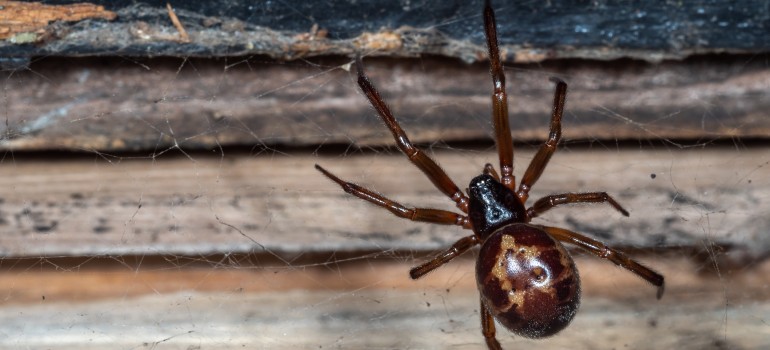
False widow spiders are among the most commonly misidentified arachnids in the UK. Their increasing presence in urban areas has sparked public interest and concern. This guide will help you identify false widow spiders accurately and distinguish them from harmless native species.
The false widow spiders form a group of similar-looking species (Steatoda nobilis, Steatoda grossa and Steatoda bipunctata). Because they resemble the much more notorious black widow spiders (Latrodectus), false widows can cause a great deal of concern when found. The most common type of false widow spider is the noble false widow (Steatoda nobilis), which has venom that is harmless to humans.
What to do if you find a false widow spider? Don’t panic – although noble false widows are among the most venomous spiders in the UK, their bites are generally comparable to those of a bee sting and serious incidents are extremely rare.
Table of Contents
What does a false Widow spider look like?
Reaching up to 15mm, or 32mm, including the legs, the noble false widow spider is an impressive creature. Its abdomen, which can be oval and shiny in appearance, is usually brownish, with distinctive cream markings and reddish-orange legs.
False widow spiders do not build nests like other species. Instead, they create scaffold webs to catch their prey.
Inhabiting houses and buildings, false widows prefer elevated places, such as the highest walls, where they hunt flying insects. In other words, they are not interested in humans at all.
Noble false widow spiders are not native to the UK. They are of Mediterranean origin and arrived on this island in banana boxes from the Canary Islands in the late 1800s. Once established, they have spread northwards, likely aided by climate change.
LearnWhat attracts spiders to your house
Does the noble False widow spider bite?
Indeed, false widows are capable of inflicting a painful bite, but they are not usually aggressive to humans. A bite from this type of spider is rare, and most of the time, it occurs in defensive situations such as being accidentally squashed or feeling threatened.
Some people may experience symptoms like pain and a tingling sensation in the bitten area. There may be itching and swelling as well, similar to those inflicted by bee or wasp stings. The symptoms usually last for 1 to 2 days, and most people do not need medical care to treat a false widow spider bite.
What to do if I find a False widow spider?
Spiders are important predators in the ecosystem. In addition to helping keep pest populations under control, they eat insects that can transmit diseases, such as mosquitoes.
With this in mind, if you have an unwanted spider in your house, you can catch it with a glass and a piece of cardboard. Hover above the spider with the glass while it is on its net, then line a piece of cardboard on the other side and trap it in. You should then release it outside and let it carry on protecting your garden.
False widows are known to live peacefully with humans. They help keep outdoor spaces clean, eliminating unwanted insects and other small creatures that can be a nuisance.
Aside from their key role in feeding on pest insects, the silk they produce is known for its unique role in the textile industry. It is used to make special clothes, such as bullet-proof vests, and false widow venom can be used in pain treatment.
False widow spider bite treatment
The first thing you should do If you suspect you have been bitten by a false widow spider is wash the bite area with soap and water. Then, apply a cold compress or ice pack to reduce swelling. If possible, raise the bitten area to reduce swelling. Avoid scratching the spot to prevent an infection.
Don’t panic if you have been bitten by a false widow spider. Most likely, you will only experience mild symptoms. You’ll probably feel a slight ache or pain around the bite and may see a small red spot. However, if you develop flu-like symptoms, seek medical attention immediately! Although this spider’s bite is not usually dangerous, some people can experience an allergic reaction.
How to get rid Of False widow spiders
If you want to get rid of the spiders in the house, you need to clean it thoroughly. Remove the webs and any dead spiders, as well as eggs and young ones. You can do this by using a vacuum or other device that will suck up the webs. You can also use insecticidal sprays to control the spiders and their prey.
Note: Spiders are beneficial, so we advise on restricting the use of lethal methods when possible.
Normally, this is sufficient to deter false widows. Some additional precautions, such as sealing off potential harbouring spots in garages and basements, may further reduce the chance of contact with spiders.
Usually, they get inside via the cracks and crevices of buildings, and the best way to prevent this is to block the possible entry points. If you’re experiencing problems with spiders and can’t deal with them on your own, there are professional spider control companies that specialise in spider removal that can help you out.
Are you dealing with a pest infestation?
You don't have to be alone in the battle against pests. Hire a professional pest expert!
Call usTakeaways
- The key differences between a false widow and a black widow spider are size and colour. Black widows are far larger and black, while their lookalikes are brown and smaller.
- False widow spiders are not aggressive towards humans. Their venom is generally not dangerous and doesn’t require special treatment unless you have an allergic reaction.
- Keep your home spider-free by regularly vacuuming cobwebs. Keep an insecticidal spray close by to prevent spiders from entering your home and taking up residence.
- Thousands of eggs are laid by a single spider, so if you see a significant increase in baby spiders in your home or yard, it may be time to call a professional pest control company.
Image source: Stephan Morris / Shutterstock

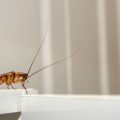


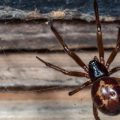
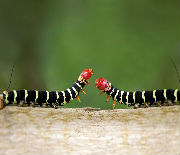
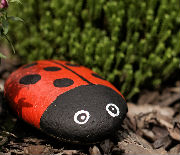
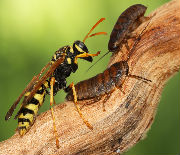
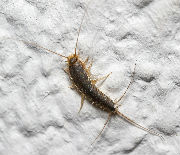
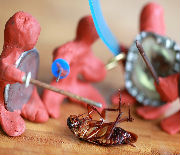
Leave a Reply